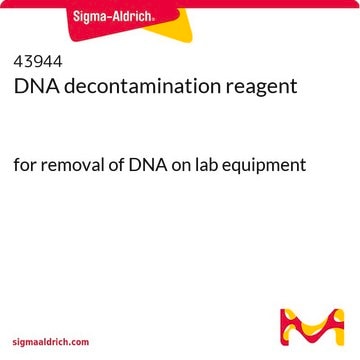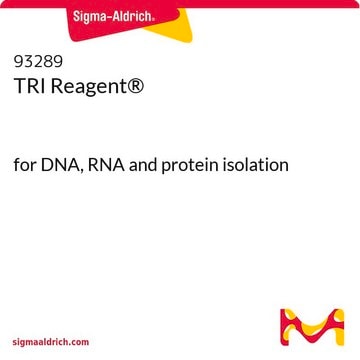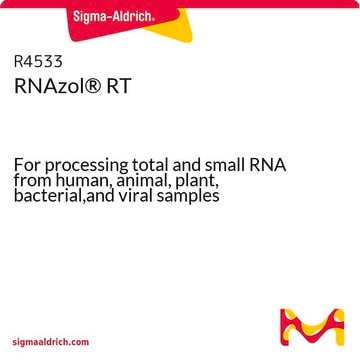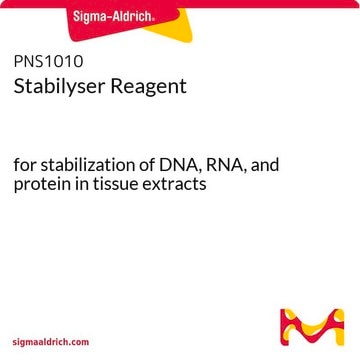R2020
RNaseZAP™
Cleaning agent for removing RNase
Synonym(s):
RNAse cleaner, RNAse contamination remover, RNAse remover
Sign Into View Organizational & Contract Pricing
All Photos(1)
About This Item
UNSPSC Code:
12352200
NACRES:
NA.52
Recommended Products
form
liquid
feature
RNase free (removal from glass and plastic surfaces)
packaging
pkg of 250 mL
technique(s)
RNA purification: suitable
pH
7.0-7.4
transition temp
flash point 100 °C (closed cup)
solubility
water: soluble
density
1000 g/cm3
General description
RNaseZAP™ is a purifying agent used for eliminating RNase contamination from glassware, plastic surfaces, reaction vessels, countertops and pipettors. It is also used for effective removal of RNase residues from microcentrifuge tubes without inhibiting subsequent enzymatic reactions.
Application
- RNaseZAP™ has been used as a cleaning agent for removing RNase from glassware, apparatus, countertops and pipettors.
- Remove RNase contamination from glass and plastic surfaces
- CAUTION: Please note that RNaseZap Solution should not be used on corrodible metal surfaces
A cleaning agent for removing RNase from glassware, plastic surfaces, countertops, and pipettors. It is also effective at eliminating RNase contamination from microcentrifuge tubes without inhibiting subsequent enzymatic reactions.
Legal Information
RNaseZAP is a trademark of Ambion, Inc.
Storage Class Code
12 - Non Combustible Liquids
WGK
WGK 2
Flash Point(F)
Not applicable
Flash Point(C)
Not applicable
Certificates of Analysis (COA)
Search for Certificates of Analysis (COA) by entering the products Lot/Batch Number. Lot and Batch Numbers can be found on a product’s label following the words ‘Lot’ or ‘Batch’.
Already Own This Product?
Find documentation for the products that you have recently purchased in the Document Library.
Customers Also Viewed
Transcriptome analysis and RNA interference of cockroach phototransduction indicate three opsins and suggest a major role for TRPL channels.
French AS
Frontiers in Physiology, 6, 207-207 (2015)
An integrative analysis of microRNA and mRNA profiling in CML stem cells
Chronic Myeloid Leukemia, 219-241 (2016)
Sandra Nwokeoha et al.
Ultrasound in medicine & biology, 42(10), 2478-2492 (2016-07-23)
The delivery of genes into cells through the transfer of ribonucleic acids (RNAs) has been found to cause a change in the level of target protein expression. RNA-based transfection is conceptually more efficient than commonly delivered plasmid DNA because it
Transport and metabolism of choline in synaptosomes: ionic requirement.
T Y Wong et al.
Biochemical Society transactions, 9(1), 84-85 (1981-02-01)
Farah J Nassar et al.
Methods in molecular biology (Clifton, N.J.), 1465, 219-241 (2016-09-02)
Integrative analysis of microRNA (miRNA) and messenger RNA (mRNA) in Chronic Myeloid leukemia (CML) stem cells is an important technique to study the involvement of miRNA and their targets in CML stem cells self-renewal, maintenance, and therapeutic resistance. Here, we
Our team of scientists has experience in all areas of research including Life Science, Material Science, Chemical Synthesis, Chromatography, Analytical and many others.
Contact Technical Service











